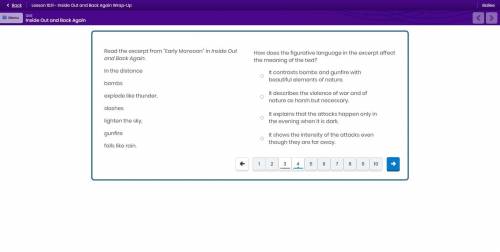
English, 20.02.2022 04:10 abbypoletick
Which lines from ““Neigh Not Hee” in Inside Out and Back Again contain figurative language?
“the pity giver / feels better, / never the pity receiver.”
“Brother Quang / has to translate, / after all.”
“Paperwork, paperwork / with a woman who / pats my head “
“Turn right where flowers / big as dinner plates / grow strangely blue.”


Answers: 1


Another question on English

English, 22.06.2019 08:00
Read this passage from the online article “top 10 reasons why everyone is doing yoga” by kathryn livingston. what type of propaganda is the author using? why are so many people doing yoga these days? there must be more to it than endorphins; there has to be a deeper reason why 20 million plus americans have fallen in love with this venerable practice. here is my top ten list – and if you’re a yogi, i’m sure you can think of more.
Answers: 1

English, 22.06.2019 13:00
In tim o'brien's chapter "good form," what does the narrator say is thehappening-truth? oa. that the man he killed was slim and daintyob. that he has never seen a dying person in his lifeoc. that he killed hundreds of men and remembers all their facesod. that he was afraid to look at the faces of the dead
Answers: 3

English, 22.06.2019 13:10
Which question would be most to ask when analyzing opportunities for women during the historical context of this passage
Answers: 1

English, 22.06.2019 17:20
Select the correct answer. what opinion about russian society does leo tolstoy express in this excerpt from the death of ivan ilyich? the awful, terrible act of his dying was, he could see, reduced by those about him to the level of a casual, unpleasant, and almost indecorous incident (as if someone entered a drawing room defusing an unpleasant odour) and this was done by that very decorum which he had served all his life long. he saw that no one felt for him, because no one even wished to grasp his position. only gerasim recognized it and pitied him. and so ivan ilyich felt at ease only with him. he felt comforted when gerasim supported his legs (sometimes all night long) and refused to go to bed, saying: "don't you worry, ivan ilyich. i'll get sleep enough later on," or when he suddenly became familiar and exclaimed: "if you weren't sick it would be another matter, but as it is, why should i grudge a little trouble? " gerasim alone did not lie; everything showed that he alone understood the facts of the case and did not consider it necessary to disguise them, but simply felt sorry for his emaciated and enfeebled master. once when ivan ilyich was sending him away he even said straight out: "we shall all of us die, so why should i grudge a little trouble? "—expressing the fact that he did not think his work burdensome, because he was doing it for a dying man and hoped someone would do the same for him when his time came. a. the peasant class in nineteenth-century russia was full of honest and compassionate people. b. educated professionals gained influence in russian society in the nineteenth century. c. in the nineteenth century, middle-class russians were rich and well-educated. d. peasants more readily accepted unpleasant facts of life, while the middle class tried to deny them.
Answers: 3
You know the right answer?
Which lines from ““Neigh Not Hee” in Inside Out and Back Again contain figurative language?
“the p...
Questions

Biology, 09.10.2019 09:50


Computers and Technology, 09.10.2019 09:50


Spanish, 09.10.2019 10:00


Mathematics, 09.10.2019 10:00

English, 09.10.2019 10:00

Mathematics, 09.10.2019 10:00

Health, 09.10.2019 10:00


Social Studies, 09.10.2019 10:00

History, 09.10.2019 10:00

Social Studies, 09.10.2019 10:00


Mathematics, 09.10.2019 10:00

Mathematics, 09.10.2019 10:00


Spanish, 09.10.2019 10:00



